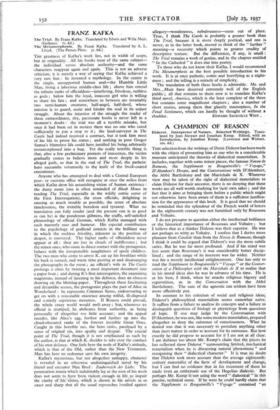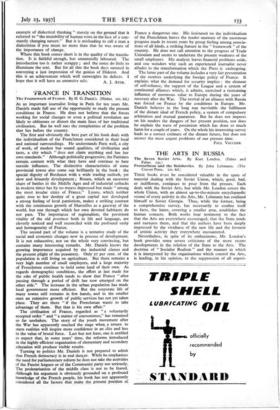A CHAMPION OF REASON •
Diderot. Interpreter of Nature. Selected Writings. Trans- lated by Jean Stewart and Jonathan Kemp. Edited, with an Introduction, by- Jonathan Kemp. (Lawrence and Wishart. los. 6d.)
THIS selection from the writings of Denis Diderot has been made with the object of presenting him as one who in a considerable measure anticipated the theories • of dialectical materialism. • It includes, together with some minor pieces, the famous Nevat de Rameau, the Supplement to Bougainville's ;", Voyage," D'Alembert's Dream; and the Conversations with D'Alembert; the Abbe Barthelemy and the- Marechale de X. ,.-Whatever view may be taken of the right of dialectical materialists to
claim Diderot for their ancestor, there is no denying that these works are all well worth studying for their own sakes ; and the fact that it aims at bringing them before a public which might not otherwise have been aware of them Is a sufficient justifica.- tion for the appearance of this book. It is good that we should be reminded that the splendour of the French world of letters in the eighteenth century was not furnished only by Rousseau and Voltaire.
I do not presume to question either the intellectual brilliance or the historical importance of Rousseau and Voltaire ; but
I believe that as a thinker Diderot was -their superior.- He was not perhaps so witty as Voltaire. I confess that I derive more
pleasure from Candide than from the Neveu de Rameau, though I think it could be argued that Diderot's was the more subtle satire. But he was far more profound. And if his mind was less acute than Rousseau's it was considerably better -discip- lined ; and the range of its interests was far wider. Neither
was his a merely intellectual enlightenment. One haS only to read the Supplement to Bougainville's "Voyage" or the Conver- sation of a Philosopher with the Marechale de X to realise that in his moral ideas also he was in -advance of his time. :He-is at his best,- I think, when he attacks religious • bigotry-and superstition, as in the Conversation with the Abbe Barthelemy. The case of the agnostic can seldom hasie been
more effectively put.
In contrast to his criticism of social and religion8 ideas; Diderot's philosophical materialism seems someWhat naive: It suffers from a failure to analyse its concepts and a failure to distinguish questions of biology or physiology from questions of logic. If one may judge by the Conversation with D'Alembert, he was not, like some modern materialiSts, prepared altogether to deny the existence of consciousness. What he denied was that it was necessary to postulate anything other than inert matter in order to account for its existence. But how
exactly he did propose to account for it I am not at all clear. I am dubious too. about Mr. Kemp's claini that the pieces, he has collected show Diderot " surmounting limited, mechanical materialism when he is cliscuising natural -phenoMena." and
recognising their " dialectical 'Character." It is true no doubt
that .Dicleiiit took more account than the average eighteenth7 century materialist of the facts. of deVelopinent and Change,
but I can find no evidence that in his treatment of them he
made' even an embryonic use of the Hegelian dialedik; But perhapS• Mr. Kehip-irtiot using the word"` dialectical this precise, techniCal sense. If he were he 'could hardly claim that the StiPPleinent to' BintgairVille's "Voyage" contained "an example of dialectical thinking "- Merely on the ground that it referred to "the mutability of human vows in the-face of a' con- stantly changing nature." But it is misleading to call a man a dialectitian if you mean no more than that he was aware of the importance of change. Where this book comes short is in the quality of the transla- tion. It is faithful enough, but unnaturally laboured. The introduction too is rather scrappy ; and the notes do little to illuminate the text. But for all this the book does succeed in conveying a just impression of the genius of Diderot. And this is an achievement which well outweights its defects. I































































 Previous page
Previous page